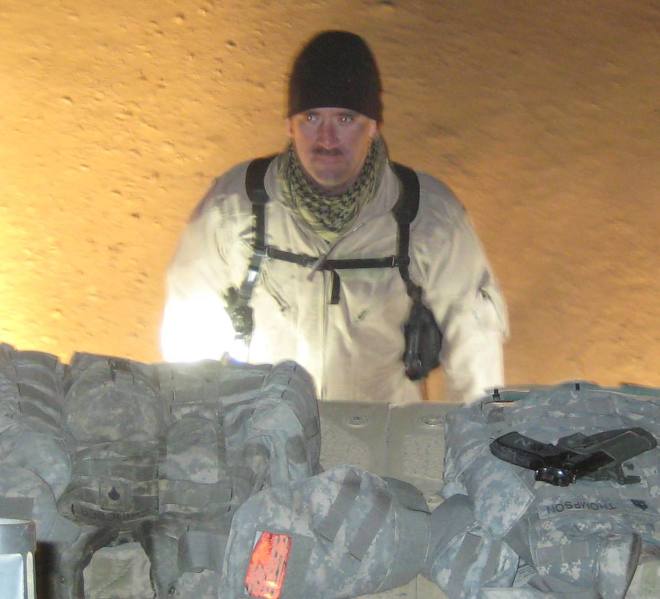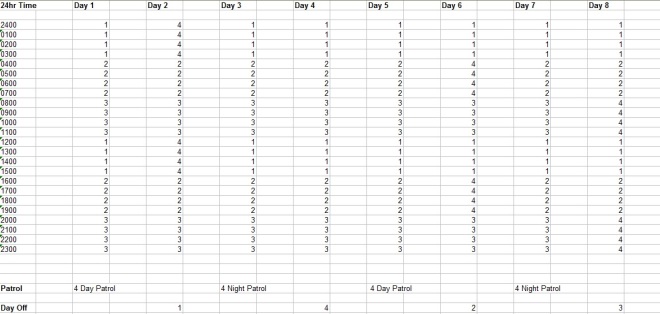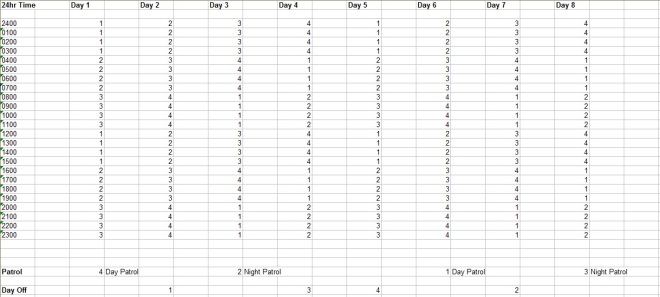
Don’t think a good “Sleep Plan” is important? Go conduct combat operations day in and day out, then tell me about it (I had the flu through most of this multi day patrol). If you have choice (as many of us that were leaders did not because the “Joes” come first, and we eat and sleep last) and you don’t set up a good sleep plan, you are asking for trouble.
While in conversation with a friend the other night, we were discussing an ongoing thread at a certain forum where I had mentioned the reality of the size of your security patrols outside of your perimeter. My premise was simple. If you had eight adults (you’re very lucky if you do) who can patrol, perform an LP/OP (Listening Post/Observation Post) function, and the LP/OP’s opposite number on the CQ (Charge of Quarters) desk, you don’t have the personnel to conduct regular four man security patrols. Reality dictates that the normal security patrol size would be two people in this scenario.
The thought on the forum was “Well we won’t send out less than a four man team (fire team sized) to do patrols.”. My thought is that if you have eight people manning these security posts and you send out four, you are seriously degrading you long term ability to maintain constant alertness and ability to perform other tasks at the retreat. The need for a properly integrated and executed sleep plan, whether you put out multi-day patrol, or standard perimeter patrols at your retreat cannot be underestimated.
“But JC, we can sleep when we’re dead. HaHa.” Yeah, real funny, but you will all be “dead asleep” if your perimeter is breached because Jack couldn’t stay awake on LP/OP duty to warn you through Jill (CQ), or Jill couldn’t keep her eyes open on “CQ” to relay Jack’s warning of the bad guys in the wire. “Just because you CAN (pull a 12 hour guard shift), doesn’t mean you should.”, when it comes to not getting sleep in a non permissive environment.
Reality dictates that your highest priority in a retreat scenario that involves possible hostiles at any time is Security. Dovetailed with this security is your Sleep Plan. Let’s look at the above retreat scenario that has eight individuals capable of manning Security or Patrol positions (Honestly, as I said earlier, if you have eight people in your group that can do this, you are doing very well in my estimation).
First priority for a retreat is manning retreat perimeter security, correct? OK, so at a minimum, you have an LP/OP post outside (I’d rather have two, but one is adequate if necessary) and a “CQ” post inside (One person) with redundant commo/alert to each other ([PACE plan] P-Field phones, A-Radios, C-Flare gun that is loud and lights the perimeter, E-Sound of gunfire ). That takes two out of the eight total. You have a 24 hour schedule to man these posts, and if you think you’re gonna make it a 12 hour post, you’re an idiot!
Eight hours is a long time to man a “Watch” post. Whether it’s the guy on LP/OP, or the guy on “CQ”, and you might still have issues regarding “complacency” even if it’s not twelve hours. Making it less could cause issues with your sleep plan however, unless you put some serious thought into the schedule. Four hours is definitely better than eight, and not only gives the people manning those posts a better chance at staying alert, it also gives that pair more daylight time throughout your multi day schedule to take care of tasks they might have been assigned (still other work other than “Security” that needs done at the retreat, correct?).
Depending on whether you decide to conduct patrols every day or mix them up, you have to make sure everyone is getting an appropriate amount of sleep. Other than the standard 8 hour recommendation that we hear from Doctors, I recommend you find out what is the norm (I do fine on 6 hours, but that’s just me) for each individual in your group, and what their “perfect schedule” is (example: They might be “night owls” and would prefer to be the night security group). I have included a sample of a schedule on an eight day rotation that has each security pair pulling rotating four hour shifts, and this is integrated with perimeter security patrols that should be at random times.


This shows a standard schedule on an eight day rotation (seemed to work best for a four group rotation). It has everyone assigned a regular duty position and daily report time. If you have “Night Owls” this is when you want to know who they are so they can pull the 2400-0800 shift (Groups 1 and 2). Group 4 rotates between “Security Patrol” one day and “Security Relief” the next.
It is important to make sure your patrol schedule isn’t too obvious, and something bad guys can figure out and predict. The the second sample schedule has some patrols scheduled for day, some for night (you never know when bad guys might be moving in your area), and some follow the day before, and some skip two days. DO NOT BECOME PREDICTABLE IN THE SHORT TERM (You have to conduct surveillance on this retreat for 16 days before you could show a patrol pattern). At the very least, change up the actual times (start a day patrol at 0800 hrs one day and 1100 hrs on the next day patrol. The same goes for night patrols)
Anyone that has conducted operations in a non permissive environment, especially over the course of four days or more, knows that the amount of sleep you get can make all the difference in your performance. In cold weather especially, everything from your attention to detail, to the immunity you have to things like a cold, can benefit or be adversely affected by how much or little sleep you get. You do what you gotta do, but not paying attention to things like your sleep plan will catch up to you eventually. Planning “worst case” is just common sense.


This schedule rotates patrol and shift duties throughout the eight day rotation. One of the advantages is everyone does a security patrol during the rotation, and also you are not stuck working one particular time frame on your guard shift. As noted in yellow, during the long days (26 hours between assigned sleep times) there are blocks of time that can be used for getting sleep if needed.
Use common sense and don’t try to be the “Tough guy”, acting like you don’t need sleep to get by. I’m telling you this because too many people don’t give something like a “Sleep Plan” the amount of importance it deserves in your planning and scheduling process. It’s not all about planning your next “combat patrol”. You won’t be planning or patrolling anything if your down for the count with an illness you could have mitigated with solid, realistic planning and a good night’s sleep.
JCD
American by BIRTH, Infidel by CHOICE

Excellent post; the devil is in the details, as they say.
Thanks Brother, it sure is.
Too True. We had to compel our officers to get sleep.The old NCOs could be found cat-napping at every possible opportunity./ S//
Pingback: MDT: Keeping Your Priorities Straight | Western Rifle Shooters Association
No argument from me on this issue. This is why I plan for 2 man patrols. Work load once agriculture starts will be huge… In the 1st winter we may have little else to do but patrol even then I ‘d rather send out 2 man patrols more often than a 4 man… exception is if we investigate something and want a bit more force structure.. but even then 4 man will be the likely max and only as a main effort
Exactly. You plan on what you can maintain. If there is a specific reason for a larger patrol group, you adjust the Security and sleep plan for that eventuality, but having a standard that can be run “business as usual” can not be stressed enough. A sense of normalcy, no matter how temporary, will be very important to the morale of your group.
Google “fm 22-51 leaders’ manual for combat stress control”.
Read it, grok it.
Big game hunters who have sat on stand for hours at a time can testify that keeping your concentration even when wide awake can be difficult. Staying on watch when sleepy – things sneak by. And in the case of guard duty, its much more than the loss of some meat.
Thank you for the article.
Yup. In the old Army asleep on guard duty was a coutsmartial offense. And before that it was a death sentence. There are many good reasons for the latter sentence./ S//
DAMN GREAT POST! Why? It is common sense AND I can relate to it thusly:
Just had a critical care emergency with one of the farm’s critters, which had a massive surgical operation. The wife took the day shift, and yours truly elected to stand watch nightly with the beast and actually bed down in its stall, with the cell phone to the vet at the ready. After 14 days of cat napping nightly on a bed of straw, jumping up at the least sound of a colic or intestinal gut murmur from the beast lying next to me–I have obtained a great SLEEP DEFICIT.
Sleep deficit is not pleasant–nope. I am, quite literally, “zombiefied.” I could only imagine how ineffective I’d be with enemy in the wire or hot lead flying. These retreat priorities have focused like a laser on a critical item–restful sleep and performance.
MEGA-THANKS!
Could you provide some advice or opinions on a decent set up for a CQ room? Is it required for that space to have LOS to any LP/OP?
Line of sight would be nice, but not a requirement. I’d give the CQ some things to be able to do some exercising if you can. Being comfortable, but not too comfortable (risk of falling asleep) chair and desk set up. The ability to do some admin work, and a good selection of reading material would probably be helpful. The most important requirement is reliable, redundant commo (field phones, radio, etc.).
Pingback: Selco: On Sleep | Western Rifle Shooters Association